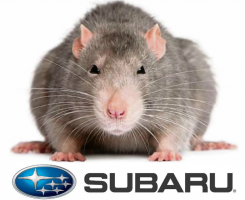— A Subaru soy-based wiring lawsuit alleges mice, rats and other rodents chew and destroy wiring and fuel lines, leaving owners with huge repair bills.
The lawsuit alleges the fuel lines and wiring use soy-based insulation that is biodegradable, environmentally friendly and less expensive than traditional insulation.
The proposed Subaru soy-based wiring class-action lawsuit includes all consumers who purchased Subaru vehicles that were sold or distributed by Servco Subaru in Hawaii from November 22, 2013, to the present.
Plaintiff Joy Diane Shuey says she purchased a new 2015 Subaru Forester from Servco Subaru, but about a month later she took the SUV back to the dealer because of a fuel odor and an illuminated check engine light.
The Servco technician allegedly discovered the fuel line and rear wiper hose needed to be replaced because they had been chewed by rats. Shuey says she paid $318.52 for repairs that Subaru didn't cover under warranty.
Shuey says she emailed Subaru headquarters and was told the automaker wasn't responsible for damage to insulation and wiring caused by rodents. The plaintiff says she took her SUV back to the dealer to once again inspect the gas lines and was told there was evidence of rats visiting the Forester, but no damage was observed.
In July 2016, the plaintiff contacted Subaru of America to let them know about the repeated problem of rats chewing the fuel lines and was allegedly told that Subaru was the distributor of Subaru vehicles for the continental United States and Alaska only. The plaintiff was advised to contact Servco Subaru in Honolulu, Hawaii.
The plaintiff says she took her SUV to Servco Subaru’s Maui service facility for miscellaneous body/trim repairs and the technician said that while performing the work, he found “rodent droppings and evidence of nest building” after removing the rear seat of the Forester.
In August 2017, Shuey allegedly had her SUV towed to Servco Subaru’s Maui dealership because of a fuel odor inside the vehicle and was told the fuel lines near the gas tank had been “chewed through by rodents,” causing a $388.09 repair bill to replace both rear fuel lines.
Later that month the plaintiff returned to the dealer because the digital dashboard was malfunctioning with fuel gauge bars not displaying, a low fuel light was blinking and the engine light was on. The dealer allegedly discovered the rear wiring harness had been damage and wrote on the bill, “rats chewed wiring harness.”
Shuey says she was charged $2,433.30 to replace the wiring harness that was chewed by rats because Subaru wouldn't cover the repairs under warranty.
According to the plaintiff, she has tried various things to prevent rodents from chewing the wiring, including hiring a pest company, spraying fluid solutions in and around the Forester, placing rat traps in her garage, using kitty litter on and around her SUV and keeping spotlights on the vehicle at night.
Because critical functions of a vehicle depend on undamaged wiring, Subaru owners say the soy-based wiring leaves them without those functions, including power steering control.
"Rodents destroyed a wire associated with my power steering. The car was towed to the dealer, and they provided a rental. The next night the same wire was again destroyed by rodents. After speaking to the dealer and doing some research it became apparent that 100% of the wires in my vehicle are insulated with a soy based material. Insulating automobile wires with soy, especially those wires related to safety equipment, is an engineering disgrace. Therefore, using the same product found in commercial rodent food to insulate vital automobile wiring is outrageous." - 2014 Subaru XV Crosstrek owner / El Cajon, California
The owner of a 2016 Subaru Impreza also suffered from power steering problems that were blamed on chewed wiring, and the only fix was a $2,800 repair bill.
"I turned my car on one afternoon and found the power steering warning light stayed lit on the dashboard. When I tried to drive, the power steering was completely gone. Dealer initially diagnosed the problem as a bad power steering control module. Three days later, after the part arrived, they installed it and found more error codes indicating a power supply error. Upon removal of power steering rack, technician found rodent damage on wiring to module on rack and pinion unit. Total repair cost was $2,800." - 2016 Subaru Impreza owner / Arlington, Virginia
In addition to losing electrical functions, the danger of leaking fuel from chewed fuel lines is obvious as a simple spark could send the Subaru up in flames. The plaintiff says none of this would occur if Subaru would have paid more for insulation and refused to install soy-based wiring that mice, rats and other rodents love to eat.
According to the lawsuit, other manufacturers sell rodent-repelling tape that can be used to wrap soy-based wiring and fuel lines.
The plaintiff says she shouldn't have been charged for repairs on a vehicle that should have been recalled long ago, but Subaru and dealers chose to make money by saying the soy-based wiring isn't a defect.
Subaru allegedly falsely advertised its vehicles as safe while knowingly selling vehicles with defective soy-based wiring and lines that will continually need to be replaced.
Additionally, Subaru vehicles allegedly aren't worth what they should be because consumers know that soy-based products attract rodents to chew and damage fuel lines and wiring harnesses. The plaintiff also says Subaru violates its warranties by forcing owners to pay for damages caused by defective insulation.
The Subaru soy-based wiring lawsuit was filed in the Circuit Court of the Second Circuit for the State of Hawaii - Joy Diane Shuey, et. al, vs. Servco Subaru, Inc, et. al.
The plaintiff is represented by Bickerton Dang, LLLP, and Christopher S. Bouslog.
Subaru is far from the first automaker involved in a lawsuit over soy-based wiring problems. Customers have filed similar class-action suits against Hyundai, Kia, Honda and Toyota.

